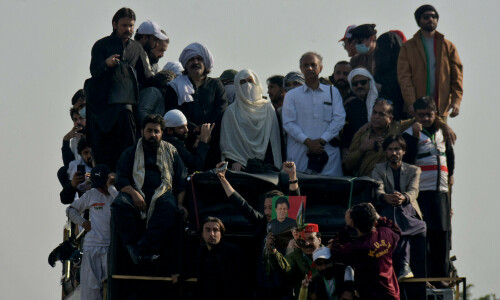 UNITED NATIONS, Nov 10: Declaring that Pakistan was “deeply conscious of the nuclear dimension of the security environment of our region”, President Gen Pervez Musharraf said here on Saturday that Pakistan’s strategic assets were well-guarded and in safe hands.
UNITED NATIONS, Nov 10: Declaring that Pakistan was “deeply conscious of the nuclear dimension of the security environment of our region”, President Gen Pervez Musharraf said here on Saturday that Pakistan’s strategic assets were well-guarded and in safe hands.
Gen Musharraf, who was addressing the UN General Assembly session attended by heads of state and government, said that Pakistan had “instituted an elaborate nuclear command control mechanism for ironclad custodial controls to ensure the safety and security of our assets.”
Gen Musharraf was scheduled to hold talks with President Bush later in the day.
The Pakistani leader’s statement was seen as gaining importance in the light of Osama bin Laden’s interview with Dawn in which Osama claimed that he had in his possession of chemical and nuclear weapons as a deterrent and warned that he had the right to use them if America employed such weapons against al-Qaeda.
Reacting to the claim, the White House refused to respond directly but said the US viewed the threat seriously. A spokesman said the US had suspected all along that al-Qaeda had been trying to acquire chemical, biological or nuclear weapons.
Underscoring Pakistan’s opposition to an arms race in South Asia, Gen Musharraf expressed Islamabad’s readiness to “discuss nuclear missile restraints as well as well nuclear risk-reduction measures with India in a structured, comprehensive, and integrated dialogue”.
In view of the importance of Pakistan in the US-led military campaign in Afghanistan and Islamabad’s role in a post-Taliban setup, President Musharraf’s speech was closely monitored.
He said Pakistan, conscious of the danger posed by the nuclear dimension in South Asia and the responsibility it placed on India and Pakistan, was ready to discuss how the two countries could establish a stable regional security mechanism through a peaceful resolution of disputes, preservation of the nuclear and conventional balance, confidence-building measures and non-use of force as prescribed by the UN charter. Gen Musharraf strongly deplored the terrorist acts of Sept 11, but said terrorism was not a Christian, Buddhist, Jewish or a Muslim belief and had to be condemned whether it was perpetrated by an individual or a group or a state.
He also emphasized that the real causes that lead to extreme acts should be understood. He said: “To my mind, it is the unresolved political disputes the world over, disputes in Bosnia, Kosovo, Palestine, Kashmir and other places. Unfortunately all these disputes involve Muslims, and more sadly, the Muslims happen to be the victims which tends to give a religious tinge to these otherwise political disputes.” The lack of progress in the resolution of these disputes had created a sense of deprivation, helplessness and powerlessness.
Referring to constant Indian criticism about “cross-border terrorism,” the general said: “The frustration gets even worse when disputes like Kashmir and Palestine remain unsettled for decades despite UN Security Council resolutions. “The question then is whether it is the people asking for their rights in accordance with UN resolutions who are to be called terrorists or whether it is the countries refusing to implement UN resolutions who are perpetrators of state terrorism.”
He pointed out that Indian occupation forces in Kashmir had killed over 5,000 Kashmiris but attributed these killings to foreign terrorists, adding that it was time India ended “such deceit”. Security Council resolutions on Kashmir must be implemented.
In the context of the events of Sept 11, Gen Musharraf said Pakistan had tried its “utmost with the Afghan government, ever since Osama bin Laden and al-Qaeda became an international issue, till the last moment to avert military action in Afghanistan. Regrettably, we did not meet with success, and the coalition operation against terrorism continued with no immediate end in sight.”
Sadly, he said, civilian casualties were getting projected more as an open war against the already poor, suffering and innocent people of Afghanistan.
Gen Musharraf called for the military operation to be as short and accurately targeted as possible, and it was also essential that a fall-back political strategy was evolved that could achieve the same objective as was sought through the military campaign.
He reaffirmed his promise of holding elections to provincial and national assemblies in October 2002 in accordance with the roadmap announced by him last August “despite the prevailing environment in the region”.














































Dear visitor, the comments section is undergoing an overhaul and will return soon.